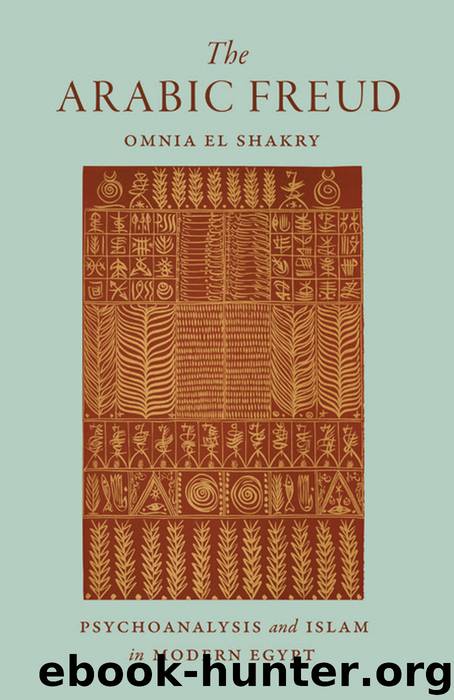The Arabic Freud by El Shakry Omnia;

Author:El Shakry, Omnia; [El Shakry, Omnia;]
Language: eng
Format: epub
ISBN: 9780691174792
Publisher: Princeton University Press
Published: 2017-01-15T07:00:00+00:00
NOTES
Introduction: Psychoanalysis and Islam
1. Yusuf Murad, “Bab al-Taʿrifat: Niwa li-Qamus ʿIlm al-Nafs,” Majallat ʿIlm al-Nafs 1, no. 1 (1945): 106.
2. Yusuf Murad, Shifaʾ al-Nafs (Cairo: Dar al-Maʿarif, 1943); Muhammad Fathi, Mushkilat al-Tahlil al-Nafsi fi Misr (Cairo: Matbaʿat Misr, 1946).
3. See Tafsir al-Ahlam, trans. Mustafa Safwan, rev. Mustafa Ziywar (Cairo: Dar al-Maʿarif, 2004). For a partial catalog of Arabic translations of Freud, see Josette Zoueïn, “Freud en arabe: Notice bibliographique,” Che vuoi? 21 (2004): 100–104. https://www.cairn.info/revue-che-vuoi-2004-1-page-101.htm. It is important to note that English and French translations of Freud and Arabic synopses were available and widely read prior to formal translation efforts.
4. Jacques Lacan, The Seminar of Jacques Lacan, Book VII: The Ethics of Psychoanalysis, 1959–1960, ed. Jacques-Alain Miller, trans. Dennis Porter (New York: Norton, 1992), 37.
5. Very few studies have addressed the grammar and vocabulary of modern selfhood within Middle Eastern societies. Anthropologists and literary scholars, however, have paved the way in this regard. See, for example, Stefania Pandolfo, Impasse of the Angels (Chicago: University of Chicago Press, 1997); Pandolfo, “The Thin Line of Modernity: Some Moroccan Debates on Subjectivity,” in Questions of Modernity, ed. Timothy Mitchell (Minneapolis: University of Minnesota Press, 2000), 115–47; Pandolfo, “‘Soul Choking’: Maladies of the Soul, Islam, and the Ethics of Psychoanalysis,” Umbr(a): Islam (2009): 71–103; Pandolfo, Knot of the Soul: Madness, Psychoanalysis, Islam (Chicago: University of Chicago Press, 2017); Suad Joseph, ed., Intimate Selving in Arab Families: Gender, Self, and Identity (Syracuse, NY: Syracuse University Press, 1999); Joseph, “Learning Desire: Relational Pedagogies and the Desiring Female Subject in Lebanon,” Journal of Middle East Women’s Studies 1, no. 1 (2005): 79–109; Joseph, “Thinking Intentionality: Arab Women’s Subjectivity and Its Discontents,” Journal of Middle East Women’s Studies 8, no. 2 (2012): 1–25; Amira Mittermaier, Dreams That Matter: An Anthropology of the Imagination in Modern Egypt (Berkeley: University of California Press, 2011); Stephen Sheehi, Foundations of Modern Arab Identity (Gainesville: University Press of Florida, 2004); Sheehi, “Inscribing the Arab Self: Butrus al-Bustani and Paradigms of Subjective Reform,” British Journal of Middle Eastern Studies 27, no. 1 (2000): 7–24.
6. I am drawing on Talal Asad’s idea of “Islam as a discursive tradition,” in “The Idea of an Anthropology of Islam,” Occasional Papers, Center for Contemporary Arab Studies (Washington, DC: Georgetown University, 1986) and Samira Haj, Reconfiguring Islamic Tradition: Reform, Rationality, and Modernity (Stanford, CA: Stanford University Press, 2009).
7. Tawfiq al-Hakim, “Introduction to King Oedipus,” in The Arab Oedipus: Four Plays from Egypt and Syria, ed. Marvin Carlson (New York: Martin E. Segal Theatre Center Publications, 2005), 16–40, see especially 22, 27, 32.
8. Salama Musa, al-ʿAql al-Batin, aw Maknunat al-Nafs (Cairo: al-Hilal, 1928).
9. On Salama Musa’s psychoanalytic forays, see Joseph Massad, Desiring Arabs (Chicago: University of Chicago Press, 2007), 128–41.
10. Musa, al-ʿAql al-Batin, 7.
11. Ibrahim Naji, “al-Shabab al-Misri wa-l-Mushkila al-Jinsiyya,” al-Hilal 47 (1938): 57–60. Naji noted that students were reading Freud outside of their university curriculum and in a rather haphazard and at times refracted fashion.
12. ʿAli Adham, “Fruyd wa-l-Harb,” al-Thaqafa 3, no. 153 (December 2, 1941): 1564–69; Sigmund Freud, “Thoughts for the Times of War and Death” (1915), in vol.
Download
This site does not store any files on its server. We only index and link to content provided by other sites. Please contact the content providers to delete copyright contents if any and email us, we'll remove relevant links or contents immediately.
| Africa | Americas |
| Arctic & Antarctica | Asia |
| Australia & Oceania | Europe |
| Middle East | Russia |
| United States | World |
| Ancient Civilizations | Military |
| Historical Study & Educational Resources |
Underground: A Human History of the Worlds Beneath Our Feet by Will Hunt(12098)
Sapiens by Yuval Noah Harari(5370)
Navigation and Map Reading by K Andrew(5156)
The Sympathizer by Viet Thanh Nguyen(4390)
Barron's AP Biology by Goldberg M.S. Deborah T(4150)
5 Steps to a 5 AP U.S. History, 2010-2011 Edition (5 Steps to a 5 on the Advanced Placement Examinations Series) by Armstrong Stephen(3733)
Three Women by Lisa Taddeo(3433)
Water by Ian Miller(3185)
The Comedians: Drunks, Thieves, Scoundrels, and the History of American Comedy by Nesteroff Kliph(3079)
Drugs Unlimited by Mike Power(2594)
A Short History of Drunkenness by Forsyth Mark(2297)
DarkMarket by Misha Glenny(2212)
And the Band Played On by Randy Shilts(2209)
The House of Government by Slezkine Yuri(2206)
The Library Book by Susan Orlean(2069)
Revived (Cat Patrick) by Cat Patrick(1991)
The Woman Who Smashed Codes by Jason Fagone(1973)
The Absolutely True Diary of a Part-Time Indian by Sherman Alexie(1913)
Birth by Tina Cassidy(1904)
